Where's the choice? Why Arizona's 2022 primary election feels like such a letdown
Corrections and clarifications: An earlier version of the editorial misstated Shawnna Bolick's position on early voting. She favors greater restrictions and ID requirements on early balloting.
The 2022 Arizona state elections have come to embody our national culture. Both are fractured from a half-dozen years of earth-shifting politics and a pandemic that killed thousands as it staggered our economy.
A heavy air of national populism still hangs from the last election and refuses to move on, encouraged by a former president who still holds a spell on many Arizona candidates. He and they continue to insist that he was robbed of victory.
Our national dysfunction is now our state dysfunction, and the coming elections bear the symptoms of a body in distress. To our eye the choice of candidates is thin and the party benches are weak. Even the issues the candidates press seem disconnected from today’s priorities. They are not always the most important issues facing the state.
With early voting rapidly approaching on July 6, The Arizona Republic editorial board looks at the state of major primary races and how outside forces have shaped them.
U.S. Senate: Roll the dice on this one

Blake Masters finally got Donald Trump’s blessing, the only thing setting him apart from his competitors in the Republican Senate primary to take on Democrat Mark Kelly.
Even so, Masters’ victory isn’t a sure bet given that Trump’s endorsement has had mixed results in GOP primaries elsewhere.
Rest assured, though, that Masters will make the most out of Trump’s blessing to break through rivals in the fight for “patriot” votes.
Listen to Masters or Jim Lamon or state Attorney General Mark Brnovich and you get the same drumbeat of a “border invasion” and Biden-induced inflation. Former state lawmaker Justin Olson and Mick McGuire, who commanded the Arizona National Guard, also are in the race but remain in the background.
Another view: How Arizona can stop electing extremists
And even then, none of the candidates have given voters much to set them apart on policy. Voters may as well roll the dice when casting their ballot.
Expect flashier TV ads in coming weeks. Money is not an object in this race. Masters is backed by conservative tech billionaire Peter Thiel. Lamon is wealthy, too, and is spending lots of his own money.
Whoever wins the GOP primary will face Kelly, who’s amassing a huge war chest himself to defend the seat. He’s generally liked among Arizonans, according to a OH Predictive Insights survey.
But all bets are off in the GOP primary and the general election against Kelly. The Cook Political Report rates this Senate race a Toss Up.
GOP governor: Fealty to Trump, not the issues
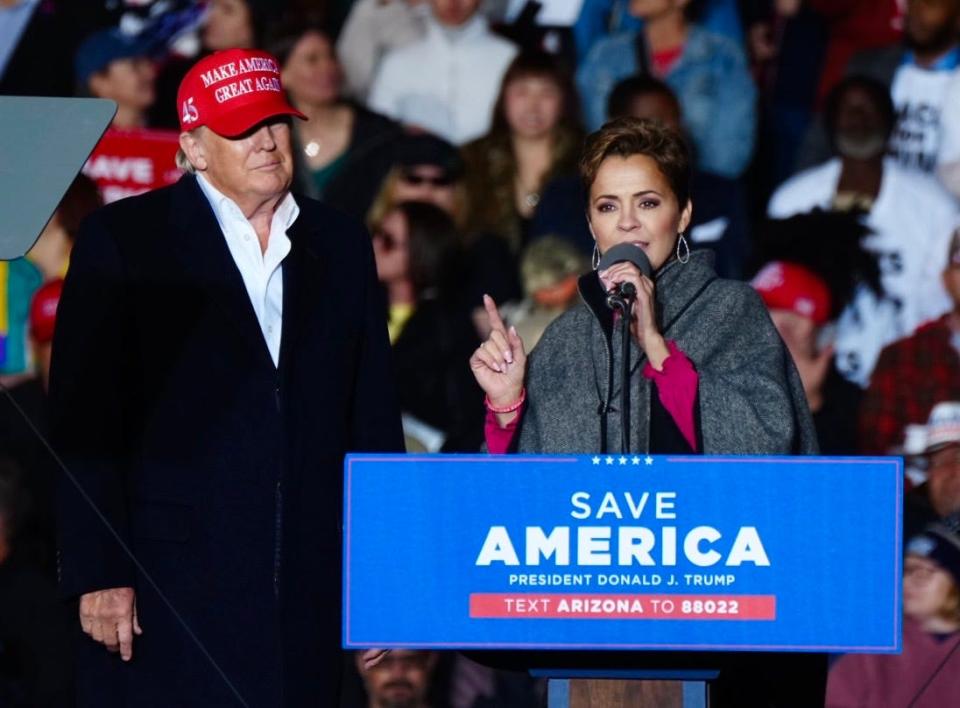
The opening crescendo in the 2022 Arizona governor’s race arrived in stilettos. Kari Lake took a sledge hammer to the flickering TV talking heads and the “mainstream media’s lies and propaganda” in a 3½ minute campaign ad.
Not only was she kicking off the race, she was hanging a lantern on her sometimes loopy departures as a Fox 10 News anchor. Her ad seemed to scream, “Hell, yeah, I’m crazy!”
Arizona was on notice. This would be an election like none in our history. And so it has been with the 2022 Arizona Republican primary for governor, beginning not with a play for voters but for the benedictions of our lord and savior Donald Trump.
Every Republican candidate tripped over themselves to win Trump’s blessing, but the anchorwoman walked away with it, proving no one will do crazy like Kari Lake does crazy.
To underscore how national division and dysfunction has framed this race, the candidates for governor sprinted to the U.S.-Mexico border. Yet governors have virtually nothing to do with border protection. They can’t really build walls. They can’t hire more Border Patrol.
And far greater challenges face the state, including the growing scarcity of western water and the exodus of public school teachers. As the GOP field hyperfocuses on migrants crossing the desert, Lake Mead is rapidly reverting back to desert.
That’s the Trump effect.
Lake’s two strongest challengers, Matt Salmon and Karrin Taylor Robson, arrived from the world of reality expressing fealty to Trump but comporting themselves in more dignified ways. This raises suspicions they won’t be carbon copies of the former president. We’ll let voters decide if that’s a good thing or a bad thing. Lesser known candidates Scott Neely and Paola Tulliani-Zen will struggle to gain name recognition in this crowded field.
Democratic governor: A case of buyers' remorse?
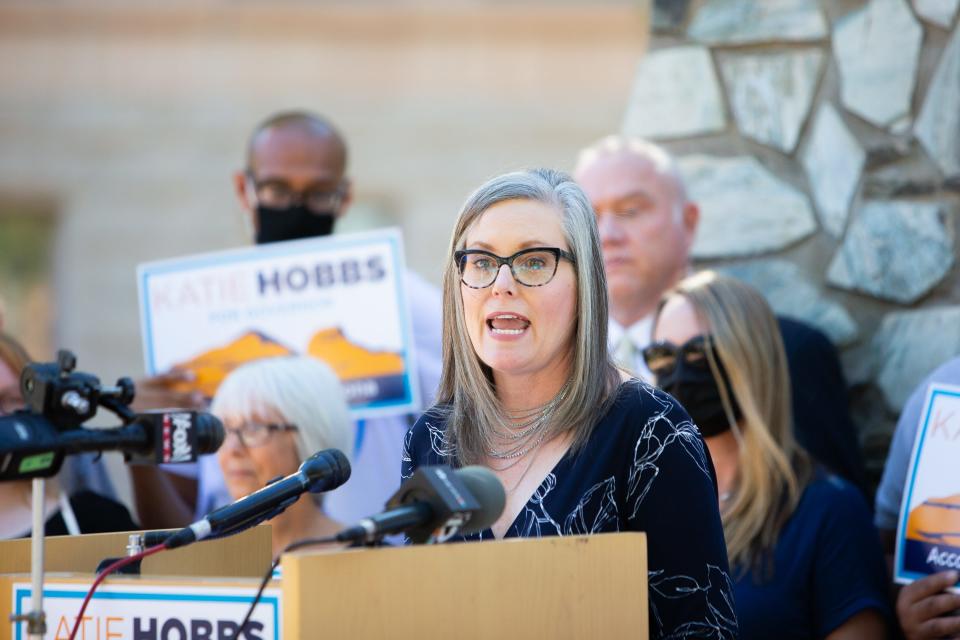
In the Democratic primary, a large part of the base suffers from buyer’s remorse. Just as Katie Hobbs, Arizona’s secretary of state, was to be anointed the party’s nominee, she caught her own pant leg in an old lawsuit.
Jurors determined Hobbs and others bared responsibility for discrimination against an African American staffer in 2015. And Hobbs bungled the damage control, failing to adequately apologize and atone for the past. All of this happened on the heels of a social revolution that was supposed to improve things for America’s historically marginalized, and Arizona’s Black leaders were miffed.
But Democratic challenger Marco Lopez has not found traction in the race, and Hobbs looks like she’ll roll to victory on the strength of her two-fisted stand against somebody else’s scandal – the Republicans and their bid to review and reverse the 2020 election results.
Legislature: An exercise in (non)choice
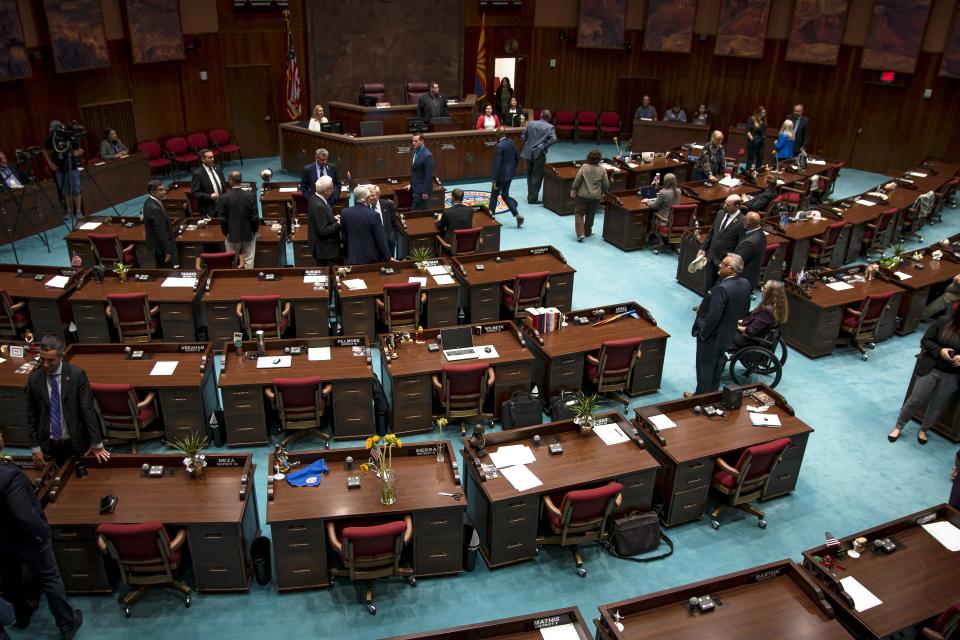
Want proof of how tribal we’ve become? Look at our choices statewide for House and Senate.
It’s easy to see which districts are heavily Republican or Democrat just by looking at how many people are running in them. Heavily red or blue districts have fielded a ton of candidates in the primary, but only token challengers (or none at all) in the general.
In the Senate, roughly a quarter of the seats have only one candidate running. So much for offering voters a choice.
Yet while there might be little meaningful competition between parties, both sides seem fine with eating their own this election. Some of that attrition happened by redistricting, as in the House race for Phoenix’s District 5, where three Democratic incumbents were shoved into the same token blue area of the map.
But several Republican incumbents also are facing populist challengers, presumably as punishment for not sufficiently toeing the Trumpian line.
Legislature: Hottest races are also the most toxic
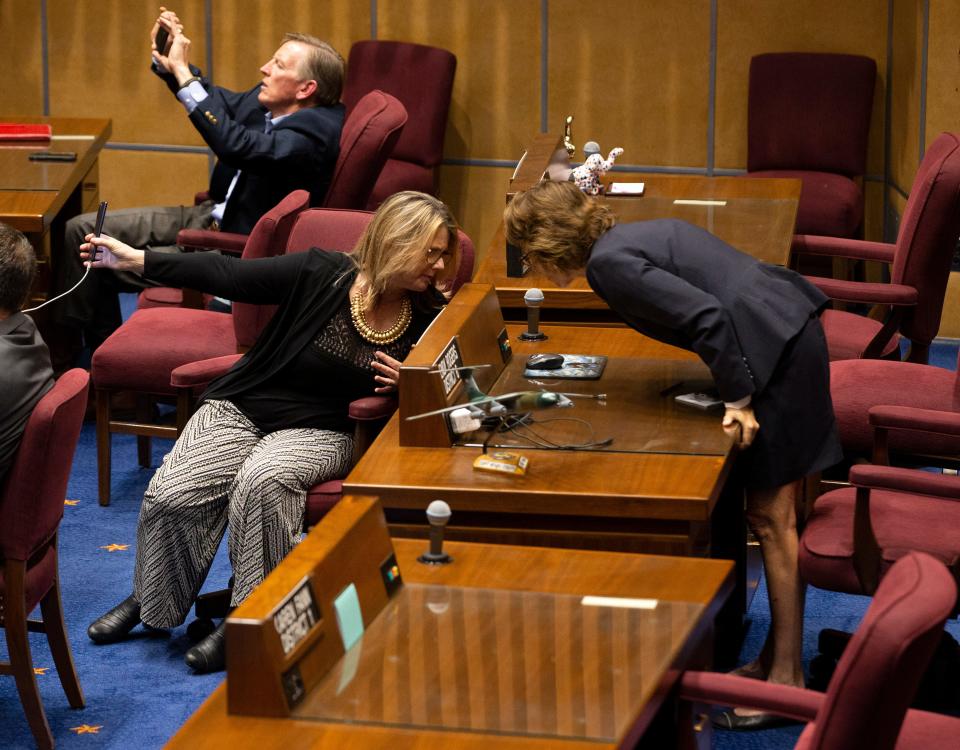
Those challengers could easily win, considering that Jan Dubauskas has raised nearly five times of her opponent, Rep. John Kavanagh, for Fountain Hills’ District 3 Senate seat.
Or that the same interests who yelled words like “pedophile” via loudspeaker outside House Speaker Rusty Bowers’ home while his daughter was dying are expected to continue their election attacks as he runs for Mesa’s District 10 Senate seat.
And that might pale in comparison to the nonsense that is spewed in the battle between Sens. Wendy Rogers and Kelly Townsend, arguably the Legislature’s two most conspiracy theory-friendly members, for the sprawling District 7 Senate seat that would serve roughly Flagstaff to Tucson.
And what about the issues?
While polling suggests voters – particularly those all-important independents – care most about the economy, that’s not where the debate is centered.
No wonder turnout is so low for the primary races that will determine the direction of the House and Senate. There may be some people and ideas to vote against, but almost nothing for anyone outside of the party’s most faithful to vote for.
And we wonder why so many residents think the Legislature is woefully out of touch.
GOP secretary of state: It's all 'Stop the Steal'
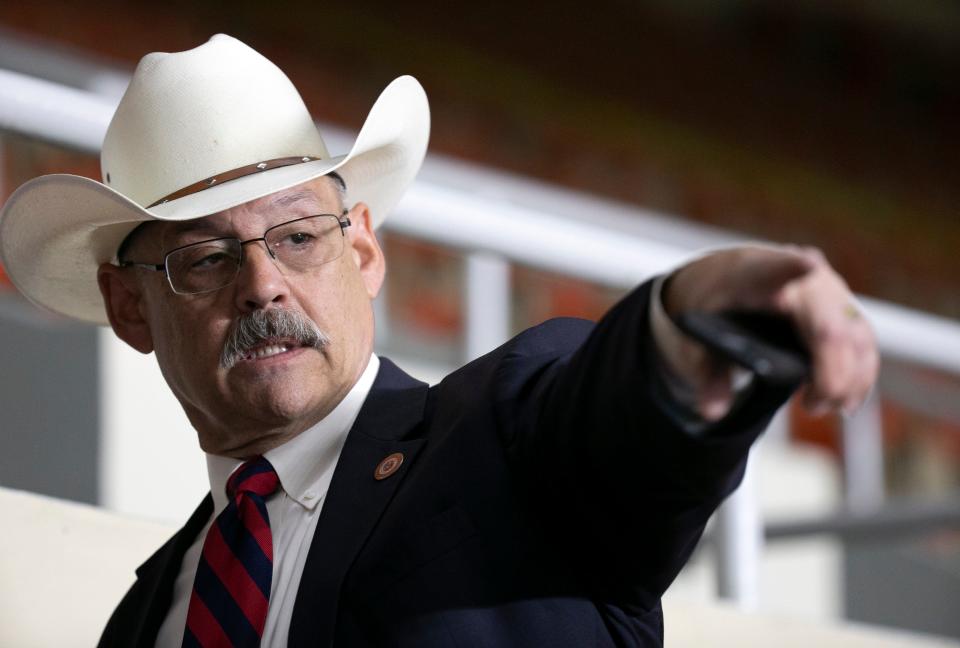
Perhaps no other race frames the 2020 presidential election, and our political divide, as sharply as the one for Arizona secretary of state.
Two of the four GOP candidates are Trump allies who questioned the legitimacy of the vote tally in Maricopa County that helped Joe Biden secure victory in the state.
One of them, Rep. Mark Finchem, peddled the “Stop the Steal” narrative that the election was rigged against Donald Trump.
Finchem attended the Jan. 6 rally in Washington, D.C., and was on the steps of the U.S. Capitol when protesters stormed inside. He defended the insurrection as “what happens when the People feel they have been ignored, and Congress refuses to acknowledge rampant fraud.”
Another candidate, Rep. Shawnna Bolick, voted for a resolution calling on Congress to either accept Arizona’s 11 GOP electors for Trump or to nullify the state’s electoral votes for Biden until the Legislature could conduct a full forensic audit. She also supports greater restrictions and ID requirements on voting by mail.
Bolick sponsored legislation that would have given the Legislature the ability, with simply a majority vote, to overturn the will of voters and impose their own choice for president.
Had either one been in the office in 2020, there’s no certainty that Joe Biden’s victory in Arizona would have been certified.
The one Republican with policy chops, Sen. Michelle Ugenti-Rita, is under attack by far-right conservatives for calling the Senate audit of the 2020 election she voted for “botched” and helping to kill more than a dozen of the more extreme voting bills sponsored by her GOP colleagues.
Those who oppose greater voting restrictions may find her objectionable, too. She is the architect of laws that remove certain irregular voters from automatically receiving early ballots and outlaw the practice of third-party collection of ballots pejoratively labeled as “ballot harvesting.”
Beau Lane, a member of the business group Greater Phoenix Leadership recruited by others to run, is a moderate and an antithesis to his GOP counterparts: He defends the integrity of the election system and wants to fight what he views are harmful efforts to curb access to voting.
Dem secretary of state: How radical on voter access?
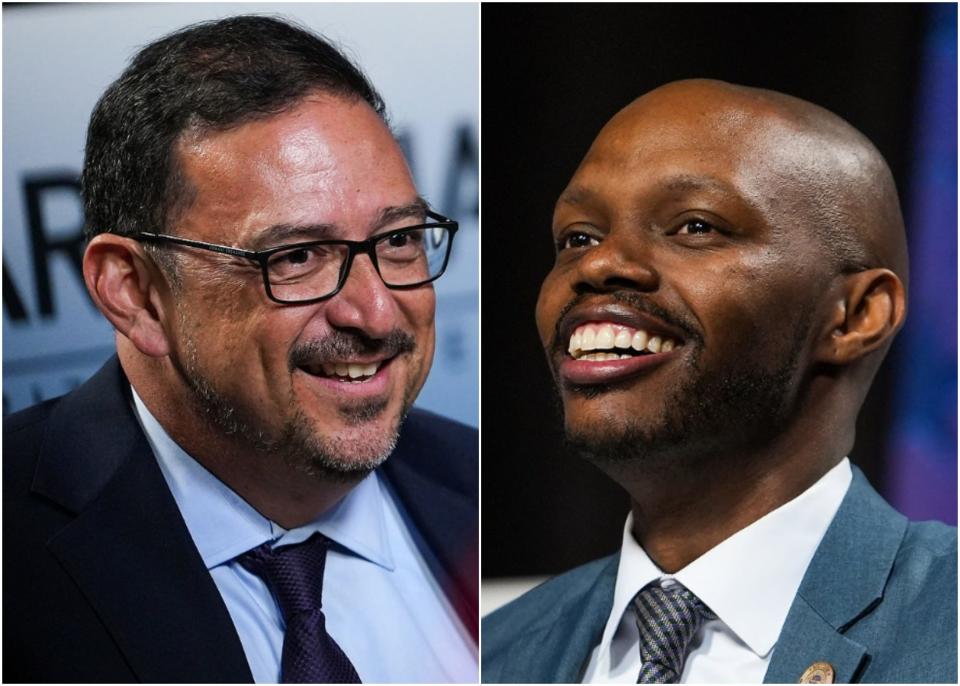
On the Democratic side, Adrian Fontes is known for aggressively pushing the envelope of voter access – he was one of the few officeholders who called on the state Democratic Party, unsuccessfully, to open its presidential primary to independent voters.
The then-Maricopa County recorder famously announced in 2020 that he was going to mail early ballots to all registered Democrats for the presidential primary regardless of whether they had signed up for the Permanent Early Voting List – only to be chided by Secretary of State Katie Hobbs that state law doesn’t give him that authority.
Now he’s bucking for her job.
House Democratic Leader Reginald Bolding has deep experience both as a community advocate, including voter registration, and as a key lawmaker in beating back legislation to restrict voting access.
Just about all the candidates pledge that they’ll check their politics at the door once they’re in office.
Given that the winner becomes the top elections officer in the state – and inherits the powers and bully pulpit that go with the title – there’s more at stake than ever in the upcoming primary and general elections.
This is an opinion of The Arizona Republic’s editorial board. What do you think? Send us a letter to the editor to weigh in.
This article originally appeared on Arizona Republic: Why Arizona's primary election already feels like a letdown

 Yahoo Autos
Yahoo Autos 